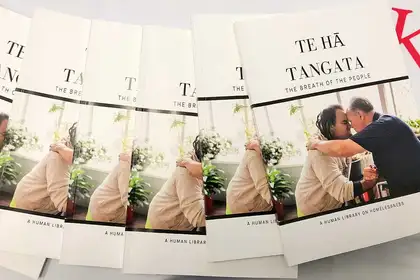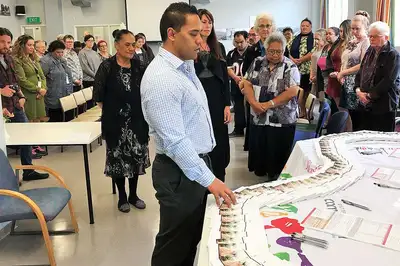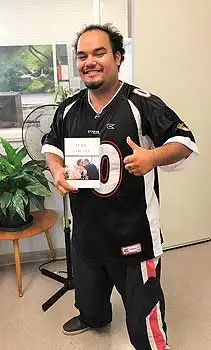
Cover of the 'human library' – a book of stories by and about being homeless in Wellington.
It can be a short trip from couch-surfing to homelessness, says Wellington councillor Brian Dawson in a documentary on a book about people who live on the streets – the work of Massey University expressive arts students.
Launched last month, the book Te Hā Tangata: The Breath of the People is the culmination of the ‘human library on homelessness’ project, which began last year as a partnership between community agencies including Wellington’s Te Pūaroha Compassion Soup Kitchen, and students in the School of English and Media Studies taking the Creativity in the Community paper. A human library is “a place where people whose stories are seldom heard are supported to tell them, to enrich our understanding of who makes up our community and what they have lived through,” says Te Pūaroha Compassion Soup Kitchen Kaiwhakahaere/Manager, Karen Holland.
The stories – and the overall project – aim to dispel the myths and stigma about homelessness arising from society’s often judgemental attitudes and lack of understanding about both personal traumas and broader policy frameworks that are factors in homelessness.
The book comprises 10 stories, including one man who was literally born on the street, another who had run away from boarding school after being bullied, and Bruce, who says in the book; “People with kids would walk past, and say, ‘Mummy and Daddy, look at this guy, what's he up to?’ And you'd hear the mother or father say, 'Don't look at him, he's pathetic'.
“The thing is, people need to stop judging, because I see a lot of people go up to them [people who are homeless] and say; 'Why don't you go and get a job, or why don't you get off your arse and do something?', and it's like, why don't you just help them up, you know, just help them up?”

At the launch, Jason Hamilton (Taranaki Whānui ki te Upoko o te Ika a Maui) blesses the books, with representatives of the Sisters of Compassion, Kahungunu Whānau Services and Massey University staff.
Ignored, kicked and spat at – life on the streets
Associate Professor Elspeth Tilley, who coordinates the Creativity in the Community class, says students and participants undertook a four-month process of collaborative workshops to develop skills and build confidence in storytelling, both oral and written. Many also produced written narratives, or with technical support from the students, developed video or audio versions.
“Many of the experiences are shocking,” says Dr Tilley, who edited the book. “NgāTaonga [the participants] told us they had been ignored, spat on, cursed at, sometimes kicked or physically abused, and almost always judged in an instant by total strangers.
“Yet in these same stories we also learned that the Taonga are witty, talented, resilient, extraordinarily courageous people. They are often highly skilled craftspeople, musicians, comedians, storytellers and performers. Many of them do in fact have jobs and degrees, including postgraduate qualifications, and all contribute their time voluntarily to help and support others newer than them to surviving life without sustained access to warm, secure, safe housing. Many of them are extraordinary creative writers, and the stories in the book demonstrate this.”

Bruce, one of the participants in the project.
Stories to challenge our thinking
“We wanted to help ensure the stories could have a wider and longer life,” says Karen Holland. “We were incredibly blessed with the courage of ngāTaonga who agreed to take part. It was a brave thing to do to share their stories with the world.”
Charles Lee, one of the students who helped film the documentary, says; “It's great to see the project having an immediate effect on an interpersonal level with not only the Taonga but also people we've interviewed and told about the project. Legislation and government can only do so much, with regard to this issue, so it's important to make an impact on a social and community level.”
Dr Tilley says that when she began teaching Creativity in the Community four years ago, and partnering with community organisations, she “knew that there was potential to really make a difference.”
“In Te Hā Tangata we have seen changes on every side – in the Taonga, who are reaching new heights of confidence and success in their lives, in the students, who have taken away life-changing lessons, and many have changed life goals as a result, and in the audiences, who told us they have completely revised how they interact with people living with homelessness, and see the housing crisis through an entirely new, deeply human, lens.”
Te Hā Tangata was an initiative of Te Pūaroha Compassion Soup Kitchen, Kahungunu Whānau Services, Te Whakamura Ai Te Ahi, and Massey University, with support from the New Zealand National Commission for UNESCO.
You can purchase a copy at https://compassion.org.nz/product/te-ha-tangata-book/
Visit the Te Hā Tangata Facebook page for more stories from the project in video and podcast: https://www.facebook.com/tehatangata/. See the Facebook documentary video on the project here.